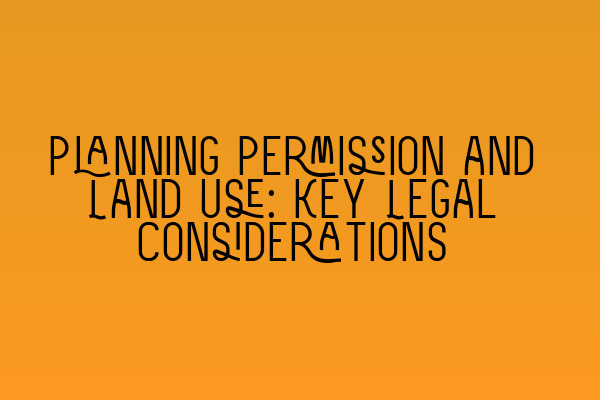Planning Permission and Land Use: Key Legal Considerations
Welcome to the blog of SQE Property Law & Land Law. In this post, we will explore the key legal considerations surrounding planning permission and land use. Whether you are a property developer, a homeowner looking to extend your property, or a local authority navigating the planning process, understanding the legal framework is crucial.
Planning permission is a legal requirement for most types of development and changes in land use. It is the way in which local authorities control the use and development of land within their jurisdiction. Obtaining planning permission ensures that a proposed development complies with local planning policies and regulations.
One important aspect to consider is the Local Development Plan (LDP). An LDP sets out the local authority’s development vision for the area and provides guidelines on land use and development. It is wise to familiarize yourself with the LDP applicable to your property to ensure your proposal aligns with the local planning policies.
When submitting a planning application, it is essential to provide all the necessary documentation and information required by the local authority. The application should include a detailed description of the proposed development, site plans, elevations, and other supporting documents. Failing to provide complete and accurate information may lead to delays or even rejection of the application.
Another crucial consideration is the impact of your proposed development on the surrounding environment and community. The local authority will assess the potential effects, such as increased traffic, noise pollution, or loss of amenity, and weigh them against the benefits of the development. It is important to address any potential concerns and engage with the local community to ensure a smooth planning process.
In some cases, it may be necessary to obtain additional permissions or consents alongside planning permission. For example, if your development involves works on a listed building or affects a protected habitat, you may need to seek listed building consent or environmental impact assessments. It is crucial to identify and address any additional requirements to avoid legal complications down the line.
Another key consideration is the timeframe for obtaining planning permission. Delays in the planning process can be frustrating and costly. Familiarize yourself with the local authority’s estimated timeframe for processing applications and plan accordingly. Engaging with professionals who specialize in planning law can help streamline the process and ensure a timely outcome.
It is worth noting that planning permissions are usually subject to conditions and time limits. These conditions may require certain actions to be taken, such as landscaping or highway improvements, or limit the hours of operation for certain activities. Failure to comply with these conditions can result in enforcement action by the local planning authority.
Seeking legal advice and assistance from professionals specializing in planning law is highly recommended. They can guide you through the complex legal framework, provide expert advice on your proposal, and represent your interests in any negotiations or appeals. At SQE Property Law & Land Law, our team of experienced solicitors can provide you with the necessary support and expertise.
In conclusion, understanding the key legal considerations surrounding planning permission and land use is vital for any property developer, homeowner, or local authority. Familiarize yourself with the local planning policies and regulations, ensure comprehensive and accurate documentation when submitting an application, address any potential environmental or community concerns, and seek professional advice. By following these guidelines, you can navigate the planning process smoothly and achieve your desired outcome.
If you found this article helpful, you may also be interested in exploring our related articles:
– SQE 1 Practice Exam Questions: [link to https://fqps.co.uk/sqe/sqe1-preparation/mcq-practice-quiz]
– SQE 1 Practice Mocks FLK1 FLK2: [link to https://fqps.co.uk/sqe/sqe1-preparation/practice-mocks-quiz]
– SQE 2 Preparation Courses: [link to https://fqps.co.uk/sqe/sqe2-preparation]
– SQE 1 Preparation Courses: [link to https://fqps.co.uk/sqe/sqe1-preparation]
– SRA SQE Exam Dates: [link to https://fqps.co.uk/sqe/sqe1-sqe2-exam-dates]
For any legal advice or assistance regarding planning permission and land use, please don’t hesitate to contact SQE Property Law & Land Law. We are here to help you navigate the complexities of planning law and achieve your desired outcome.
